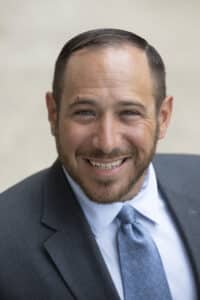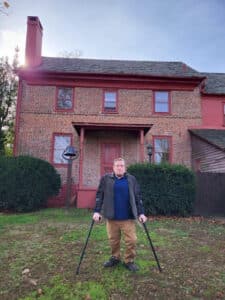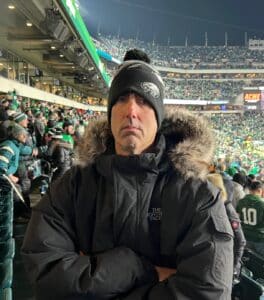
Op-Ed: Crossing Guards Protect Our Kids, But Who Protects Them?
December 13, 2024 — It’s heartbreaking, yet again…
In the last two weeks alone, we have seen two crossing guards killed in the line of duty. Robert Bork, 75, of High Bridge, and Bruce Morlack, 74, of Burlington, were killed after drivers failed to stop. Crossing guards are on the front lines of the traffic violence epidemic in our state, which has seen a 37% increase in pedestrian fatalities since 2023.
Equipped only with a handheld sign and a colored vest, we send them out into the middle of dangerous streets to take on people driving distracted, and at high speeds, playing chicken with everyone they see in a crosswalk. Crossing guards are in combat every day – and we call the resulting deaths and injuries “accidents.” These are not “accidents.” Think about it – We don’t send crossing guards to intersections safe enough for children to cross on their own. If all of our intersections were designed safely, our crossing guards wouldn’t be risking their lives every day. When planes crash, we as a society expect answers and solutions. Likewise, traffic crashes are fixable problems, caused by dangerously designed streets and unsafe drivers.
By looking at the roadways and intersections with the highest number of serious crashes, our traffic experts can predict where crashes are most likely to happen again, and they have a toolkit of proven safety countermeasures that reduce the risk of serious crashes at those locations. In fact, engineers had already been working on such a solution at precisely the location where Bruce died, but sadly weren’t able to implement it in time to save his life. The process simply took too long.
But ask yourself, “Why does it take a tragedy to prompt urgent action?”
While we are glad that people are finally discussing the need to better protect our crossing guards on the roads where Robert and Bruce were killed, we urge New Jersey to take that same proactive approach toward safeguarding everyone, at all of our dangerous intersections, before a fatal crash occurs.
For too long, we have approached traffic safety in fragmented ways—reacting to tragedies rather than preventing them. We need a holistic, proactive, outcome-oriented safety action plan, not just for crossing guards, but for all road users. That is why we are eager to see the NJ Senate pass S361/A1476, the New Jersey Target Zero Commission Bill, without additional amendments or delays, and for the Governor to promptly sign it into law.
This bill, supported by the 18,000-member Institute of Transportation Engineers (ITE), represents a paradigm shift. When signed into law, New Jersey will be the first state in the nation to bring together 13 state agencies to develop a comprehensive, data-driven action plan to completely eliminate traffic fatalities and serious injuries by 2040. The bill addresses the root causes of traffic violence using the Federally-approved Safe System approach which emphasizes safer roads, safer road users, safer speeds, safer vehicles and post crash care. It will analyze physical transportation designs with a focus on the equitable treatment of all transportation users, ensuring that the most vulnerable – children, seniors, pedestrians, cyclists, and communities disproportionately impacted – are prioritized.
We grieve the tragic deaths of Robert and Bruce and, sadly, 661 others killed so far this year alone on our roads. We are haunted by the prospect that someone’s child, loved one, family member or friend may not return home, even as you read this. Please join us in calling for an end to more business as usual, and help us turn tragedy into action. Call or write your state Senators, and tell them “No more amendments, no more delays! Pass the Target Zero Commission Bill now!”














































































